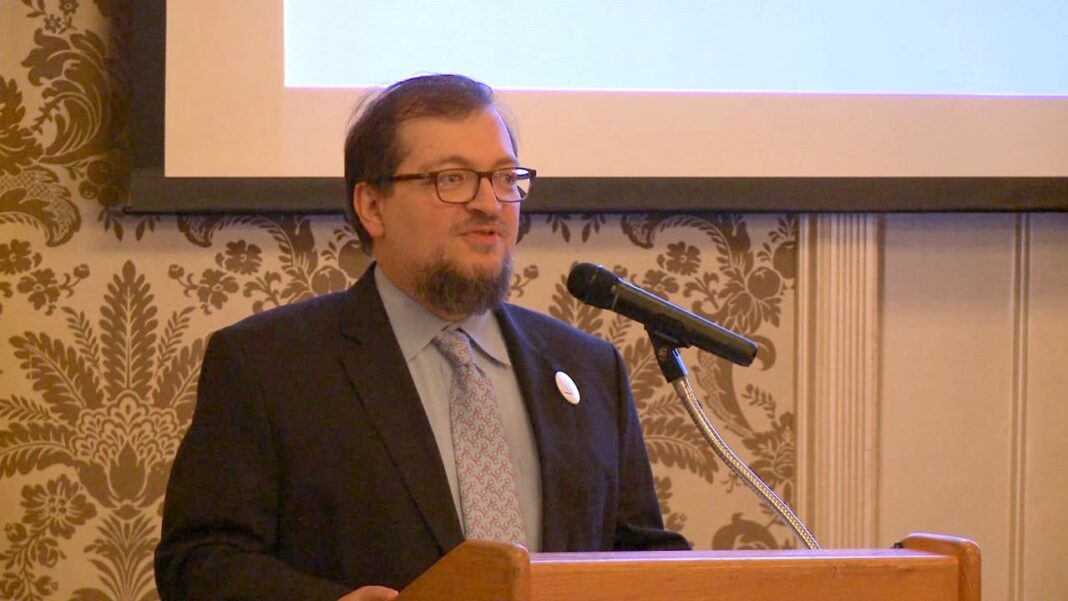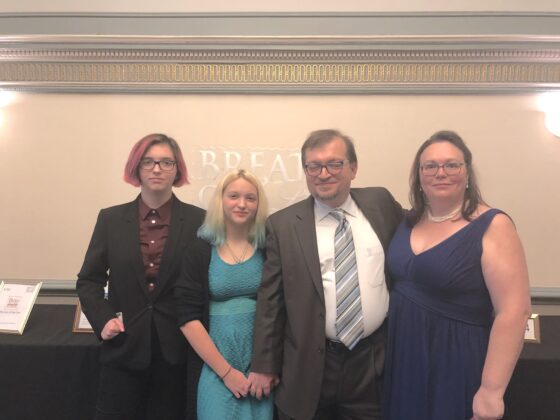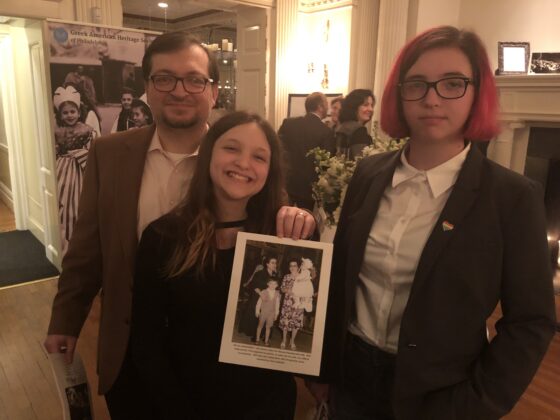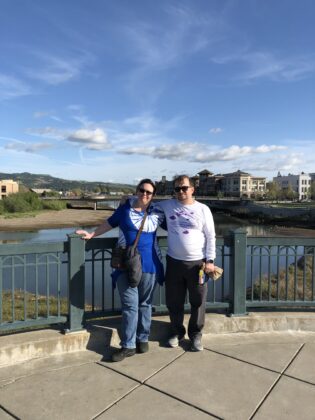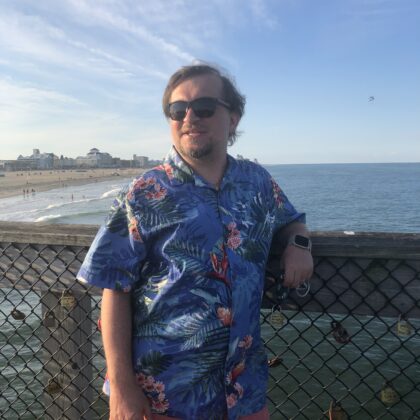Special to the Hellenic News of America
The most famous line in the 5th Century Hippocratic Oath for physicians, “Do No Harm” is easily expanded in today’s worldwide medical community to include “relieve suffering.”
Dr. Denis Hadjiliadis, a well-known Penn Medicine pulmonologist who works with patients with cystic fibrosis and others afflicted with chronic respiratory diseases, has taken that to heart.
After a year of sabbatical, Dr. Hadjiliadis is nearing completion on new training in palliative care and hospice medicine.
The focus is on providing a decent quality of life and alleviating symptoms for patients coping with a chronic illness, as well as end-of-life care for those with limited life expectancy.
“I started mostly with an interest in research, but over time I ended up finding patient interactions a lot more rewarding,” Dr. Hadjiliadis says.
This 49-year-old Canadian-born Greek still has patients he first saw when he came to Penn Medicine 16 years ago.
“I know them. I’ve seen them grow up. That’s what I find the most rewarding,” he says. “Treating people for a long time you develop long-term relationships and you look at the whole person.”
His recent training is an extension of his decades of work. Dr. Hadjiliadis is the director for Penn’s Adult Cystic Fibrosis program, one of the largest programs of its kind in the country.
He hopes to integrate palliative care and hospice medicine work with his years of experience and research in pulmonary medicine to help patients cope better and get better.
The goal is to give patients with chronic respiratory conditions opportunities to deal with their lives and their legacy on their own terms.
What is Cystic Fibrosis?
Cystic fibrosis is a genetic autosomal recessive disease that only happens when a specific gene is received from both parents.
It affects a protein in the body, generating thick mucus that over the years interferes with lung function, pancreatic functions, digestion, and other parts of the body.
It is, sadly, the most common genetic disease for Greeks and is most often seen in those of European Caucasian descent.
There is no cure so standard treatments have focused on mitigating the symptoms.
“In the lungs, if they have mucus they have to find ways to make it easier to loosen up the mucus so infections don’t happen.”
To improve breathing, treatments can be as simple as exercises, or physical therapy, to nebulizer medications, to the ultimate—a lung transplant.
For those who can’t digest food because the pancreas isn’t working, doctors will prescribe pancreatic enzymes, or insulin to control diabetes.
The good news is there are newer medications that treat the underlying cause of cystic fibrosis and reduce the severity of symptoms.
Approved about a year and a half ago, elexacaftor/tezacaftor/ivacaftor (Trikafta) improves the protein defect in 85 to 90 percent of patients.
“This is research that has been developed and it has made a big, big difference in the quality of life and survival of patients already,” Dr. Hadjiliadis says.
The mRNA techniques used to develop two of the new COVID vaccines have also been utilized and are in trials for patients with cystic fibrosis.
There is new research in development, where mRNA for the normal protein is delivered to the lungs of patients via a nebulizer and the normal protein is made, bypassing the genetically flawed protein that causes cystic fibrosis.
The effect is temporary and would have to be continually administered, but it shows promise and could potentially further improve lung problems.
Greece is just slightly behind in its cystic fibrosis care. Elexacaftor/tezacaftor/ivacaftor was just approved in the end of April of this year.
But the nation is quickly catching up. It is currently creating a patient registry to identify who has the disease and how to best treat them
“It has been a little bit behind but it’s not far behind,” Dr. Hadjiliadis says.
Lung transplants
When disease makes breathing extremely difficult, lung transplants are also an option. Dr. Hadjiliadis is an expert in lung transplantation and is part of the Lung Transplant team at Penn.
He has also been the physician leader of the Advanced Lung Disease Research Group until recently.
His responsibilities have included managing lung transplant recipients before and after the transplant.
“Transplantation can take patients that are very sick and make them extremely well,” he says. “You have people who can’t breathe. They cannot say a word to you. You do a transplant and suddenly you have someone who has a new lease on life.”
Young patients benefit the most from lung transplants since the rest of their body is strong, even if their lungs aren’t. One of the youngest group of transplant recipients have been those with cystic fibrosis.
Advances in lung transplantation have opened up the procedure to older patients to treat COPD and pulmonary fibrosis, amongst other illnesses.
The biggest advance has been the ability to keep patients alive longer, buying time while they wait for a lung donor.
Devices can “clean up” the blood to give oxygen and remove carbon dioxide and donor lungs can be preserved longer out of the body to make sure they are appropriate for the recipient.
COVID-19 progress
On the COVID-19 front, Dr. Hadjiliadis is optimistic that vaccines will contain COVID-19 to the point it will be treated as a common cold.
“I don’t think we’re in the clear as far as basically never getting anything again,” he says. “It might take a few years before it’s a common cold and we don’t care as much about it anymore.”
The virus is still causing deaths and putting people in hospitals, but those numbers are lower. Vaccinations and natural immunity from those who have already contracted the virus should keep the numbers down, or at least cause milder versions of the illness.
That’s the most important thing, to prevent the virus from leading to more severe life-threatening diseases.
Vaccinations also protect others with compromised immune systems, like transplant patients and cancer patients.
“Having people around them that are protected, protects them because they might not be able to do that with their own immune system,” Dr. Hadjiliadis says.
Since the pandemic started, medical researchers have learned a lot more about the novel coronavirus and what works in treating patients. Steroids and antiviral medications work well. Blood thinners to prevent blood clots are also effective.
“If you’re a person that gets sick, if you‘re a person that develops complications, we might be able to get you medications that prevent you from getting very sick or dying.”
Now, instead of moving people to ventilators right away, there are protocols to try other techniques first to improve breathing, like lying on your stomach, for example.
Looking ahead, flexibility, early testing, and contact tracing will be critical weapons to fight future pandemics, he believes.
Greece, for example, listened to its experts and saw what was happening in Italy so they locked down the country early, even though they only had a few cases of COVID-19.
“Greece went out of the first wave every day having single-digit cases,” Dr. Hadjiliadis says. It essentially allowed Greece to skip one of three waves of the virus that was doing so much damage in the United States and elsewhere.
His interest in medicine
Dr. Hadjiliadis came from parents who were both involved in science. His father, Nicholas, is now a retired chemist and an emeritus professor. His mother, Margeta, is a retired pharmacist.
“I saw them do a lot of research. I went into it thinking the research in medicine side of it would have the most impact and be the most interesting,” he says.
He knew he didn’t want to be a surgeon but he was fascinated by physiology and how disease affects the whole body.
He favored internal medicine and chose pulmonology because breathing is such an important function and affects us in so many different ways. It also gave him a chance to work directly with patients.
Family roots
Dr. Hadjiliadis happened to be born in Canada because his father at the time was doing his Ph.D. at a Canadian university.
The family returned to Greece, where Dr. Hadjiliadis and his sister were raised.
After finishing high school in Greece, Dr. Hadjiliadis decided to do his college studies in Canada, where tuition was cheaper because of his citizenship status.
Graduating with honors, he did his undergraduate work at McGill University and medical school work at the University of Toronto in Canada. He earned a master’s of health sciences degree from Duke University Medical Center and a Ph.D. in Medicine at the University of Ioannina in Greece.
His Residency was at the Mayo Graduate School of Medicine and his Fellowship was at Duke University Medical Center and the University of Toronto.
Dr. Hadjiliadis is currently the Paul F. Harron Jr. Associate Professor of Medicine at the Perelman School of Medicine of the University of Pennsylvania.
He and his wife, a neuro-oncologist, decided to move to Philadelphia because of the career opportunities here.
“We wanted to find a place that would fulfill both of our careers,” he says.
Today, most of his family is still in Greece, except for his sister, who is a mathematics professor at the City University of New York.
Dr. Hadjiliadis is married with two daughters.
Greek family values
Growing up, “it was a good and loving family,” he says.
His mother was able to work as a pharmacist at the hospital and still provide the family everything they needed.
“She had an amazing ability to keep everything together. I don’t know how she did it,” he says.
Dr. Hadjiliadis also benefitted from the wisdom of his two grandmothers, both single mothers and uneducated.
“They both dedicated their lives to helping out their kids, I and my sister in their own way,” he says.
His father’s side of the family came from refugees out of Asia Minor. His great grandparents had to leave everything behind and they had to build their lives all over again.
His Greek upbringing taught him that in all things, it’s family first.
“If you are part of a family you stick together and you support each other no matter what,” he says. “You may disagree, you may fight. In the end, it doesn’t matter.”
Support for family was coupled with a strong work ethic and an emphasis from both grandmothers on getting an education to better oneself.
“People used to think you get a job through your education,” he says.
But it’s more than that. “Education helps you get an open mind, examine things easily, understand the things around you. That makes you potentially more adaptable and more resilient to the things around you.”





